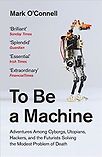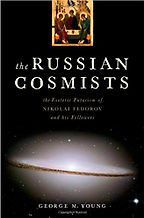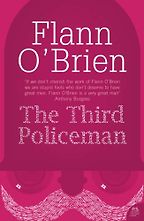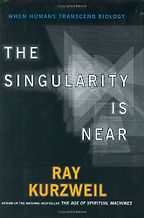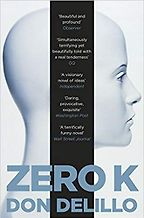In To Be a Machine you write that your wife Amy said about the birth of your first son: “If I’d known how much I’d love him, I wouldn’t have had him.” How do we get from there to transhumanism?
It is the best line in the book, and it is the one line that is continually quoted back to me. I still remember when she said it and being really moved by it. But what I don’t go into in the book is the other dimension of it, which is the writer part of my brain taking over and going, ‘I need to write that down.’ And then sneaking out of the room to jot it down. That was the thing that stuck in my head. It was the moment where the anxieties about fragility and mortality bubbled up for me. When we had our first kid, that intersected with transhumanism in this slightly weird way. I’ve come to think of it now, in retrospect, as a confluence of obsessions. A psychoanalyst would talk about sublimation. Transhumanism became this way of dealing with those anxieties. Writing about it was a distraction from them that also allowed me to deal with them.
“I don’t consider transhumanism a religion, but I do consider it useful and maybe necessary to consider it alongside religion”
I had previously written a short magazine article about transhumanism, but it was never something that I really considered as a serious topic for me until the birth of my child. That led to me getting consumed by this idea of a movement where people wanted to roll up their sleeves and do something about mortality. I guess I’ve always been drawn towards Promethean projects and transhumanism does seem to be an explicitly Promethean set of ideas but, yes, it took me a really long time to convince myself that this was a topic that I could write about. I don’t come from a science background and I don’t have a firm grounding in technology. I come from a much more humanistic background. But it eventually became clear to me that that lack of grounding could be a feature rather than a bug, to use the tech term. And that, thank Christ, has been people’s general reaction to the book. They’re not saying, ‘who is this guy who doesn’t know anything about science writing about these topics?’ but rather, ‘it’s interesting that someone’s coming at it from a humanistic perspective.’
You argue that transhumanism is not a perversion of religion but a new expression of the same immemorial yearnings and frustrations. So, if it’s not a religion, what is it? A cult? The future?
I don’t consider transhumanism a religion, but I do consider it useful and maybe necessary to consider it alongside religion. It’s probably closer to a religion than any of those other things. How would you define religion? I imagine that there should be some kind of God or gods or god-type figure. I don’t think transhumanism has that. You could argue that artificial intelligence or future technology per se is a god-like presence for transhumanists. But there is no worship involved, or any formalised worship anyway.
Get the weekly Five Books newsletter
Is it a cult? I don’t think so because there’s nothing authoritarian about it. There’s no set dogma or one thing that you have to believe to be a transhumanist. I tend to focus in the book on the movement itself. I focus on people who self-identify as transhumanists: those who go to meetings, are a part of associations, and are publicly identified with the movement. But one of the things that I realised really quickly when I started writing the book is that there are those people, but then there’s the broader field of people working in technology or in Silicon Valley. And I’ve met a lot of people who wouldn’t necessarily identify as transhumanists, or even be familiar with the term, but once you start talking about these ideas—once you start talking about the singularity or some form of merger with technology—they will say, ‘oh yeah, I’m into that. I’ve thought about that, I’ve read bits and pieces about that, and I think it’s the future. I think it’s a desirable thing.’ So, I think this broader field is worth bearing in mind when you’re trying to define a ‘movement.’ Even with people like Elon Musk, I think he’s more or less explicitly a transhumanist although he’s never identified with any formal movement or anything like that.
I guess that for many people who are interested in transhumanism, it’s about liberation. But you also refer to Theodore Adorno and Max Horkheimer’s observation that technical rationality is the rationality of domination — the compulsive character of a society alienated from itself. If transhumanism is the future, is it a future dominated by the likes of Peter Thiel?
I’m not explicit about it in the book, but I think those who have read it would not be surprised to hear me say that I lean towards this. If it is the future — and that’s a big if — then I think it’s a pretty nightmarish set of scenarios, really. I think it’s would lead to a radical exacerbation of the kinds of social inequalities that we’re already dealing with. Peter Thiel is the first person I think of when I think of this. Who would be the person who would avail of these cognitive enhancements and radical life extension therapies and so on? It’s probably not you or me. It’s much more likely to be a Peter Thiel or an Elon Musk. That alone is a deeply troubling prospect.
“Transhumanism is a larger than life funhouse mirror distortion of the way that things already are”
Having said all that, my interest in transhumanism was never really about viewing it as a set of possibilities for the future — as in, is this the future or humanity or is it a delusion? Obviously, I deal with that, but for me it’s much more a way of seeing the present. Transhumanism is an idea that is happening right now. It does seem to me to be a very extreme and a somewhat neurotic way of thinking about the human condition and technology and so on. What does it say about us and our culture? What does it say about Silicon Valley? I come out and say, more or less explicitly at the end of the book, that I don’t know what the future is but I know that this is the present and this is weird enough for the time being. I don’t have an ability to read tea leaves or even a real desire to make a strong claim about these types of technologies or movements. I think of it in terms of J. G. Ballard’s idea of extreme metaphors. I see transhumanism as a really extreme metaphor for a number of things: for the immemorial anxiety about death and mortality, and where capitalism seems to be going at the moment. In a way, it’s a larger than life funhouse mirror distortion of the way that things already are.
Let’s go to your first book: Frankenstein by Mary Shelley. How does this relate to transhumanism?
I read Frankenstein years ago in college. You know when you have the vague sense that you need to go back to a book because you know there’s something in it that can give you something? I don’t think it comes into my book all that much — in fact, I don’t think I even mention it — but I did read it a couple of times whilst writing the book. I was surprised to see when I went back to it that Frankenstein’s explicit aim in making the creature is to tackle mortality. The book is subtitled ‘The Modern Prometheus’ and it’s about the Promethean urge and the way that it can lead to really quite insane avenues. Does it speak directly to transhumanism? I think so.
I thought about it a lot when I was writing the book, particularly the chapter about the DARPA Robotics Challenge. I was trying to find ways to get to grips with the uncanniness of those creations. I tried to reach out to Boston Dynamics a number of times when I was writing the book, and fairly recently since, but they don’t seem to do a lot of press as far as I can see. I’m convinced that their whole thing is like a viral marketing campaign for some future horror movie based on humanoid robots. There’s no other reason why they would be constantly releasing these terrifying videos. So I was trying to think of ways that I could think through the terror of these robots. What is this feeling that you get when you look at these uncanny human-like but very inhuman creations? Frankenstein was something that helped me think that through. There’s an amazing passage [at the beginning of chapter four] where Shelley talks about Frankenstein’s horror at the creature. He’s looking at his lips and his hair, and there’s a deadness to him, but there’s this weird, uncanny paradoxical combination of living death. Frankenstein talks about how it’s the nearness to life that’s so terrifying about it. It’s just slightly off. So, she defined what the uncanny valley is in this really interesting way, well before it was even a concept. I think there’s something about the monstrosity of the monster that speaks to transhumanism, in a way.
Your second choice is The Russian Cosmists: The Esoteric Futurism of Nikolai Fedorov and His Followers. For many people the cosmists may be quite obscure. Can you tell us something about them and trace a link to transhumanism?
I didn’t write directly about the cosmists in the book, but I spent a lot of time reading about them and getting really fascinated with the whole pre-history of transhumanism that is Russian cosmism. But I’m not sure that there is any direct intellectual through-line between those guys and transhumanism. Obviously, there are certain transhumanists who are well-aware of what those guys were doing and are interested in it. I’m sure Anders Sandberg, for instance, is probably well-up on all of that stuff. So, I don’t know that there is any direct lineage at all. That was what interested me about it: so many of these ideas were existing at the time when the technology and the culture were completely different. But their ideas were every bit as crazy as — actually, probably much much crazier than — today’s transhumanists. There was no sense that the technology was even theoretically in the ballpark of being able to do what they wanted to do back then.
The cosmists had this idea of humans becoming the consciousness of the universe.
Yes. One of the ideas that was really intriguing to me was this notion that Konstantin Tsiolkovsky put forward. He had this notion that it was the duty of Mother Russia and the Russian people to resurrect every person who had ever died. He didn’t really talk globally, actually. He was only interested in making Russians immortal, which I find entertaining. The idea was that this generation of Russians digs up the previous generation. He doesn’t go into the specifics scientifically, but it’s your responsibility to bring your father and mother back to life. And then, once they’re reconstituted, they dig up the previous generation. So, eventually, you have the situation where everyone who has ever lived, going back to Adam and Eve as he puts it, is resurrected and brought back to life. It’s completely crazy and it totally reminds me of Flann O’Brien’s novels. But it was taken quite seriously at the time. There were serious Russian intellectuals and artists who were persuaded by this, if not the details then at least by the spirit of the enterprise. These included, most notably, Tolstoy. He wasn’t a signed-up cosmist but he was really drawn to it. So, I think, was Dostoevsky, though to a slightly lesser extent.
“There was no sense that the technology was even theoretically in the ballpark of being able to do what the Russian cosmists wanted to do back then”
With contemporary transhumanism, there does seem to be a fair amount of Russians who are on board with it as well. I never really got under the skin of it too much but it seemed to me something to do with Russia’s sense of itself and America’s sense of itself. Both of these countries as cultures are really tied in with the notion of technological progress. Obviously, you immediately think of the Cold War, but cosmism predates this by a couple of generations. I just thought it was really interesting that there was a previous transhumanism.
With the process of writing and abandoning things from books and cutting out entire sections, at this point I’m not entirely sure why I cut out the whole thing about cosmism. I spent a really long time looking into it, writing about it, and got really fascinated by it. I think it just broke up the flow of the book to a degree. John Gray had already done it really well. That was probably part of it.
Your third choice is The Third Policeman by Flann O’Brien. It’s brilliantly funny and, I think, terrifying, but what has it got to do with transhumanism?
I thought about this book all the time while I was writing To Be a Machine. This may be just the result that I think about Flann O’Brien an awful lot anyway. My master’s thesis was comparative study of Flann O’Brien and Jorge Luis Borges. These are two writers who I think have an incredible amount in common. Borges was a huge fan of O’Brien. So, I have been obsessed for a long time with O’Brien generally and The Third Policeman in particular.
What links it with transhumanism in my mind is that a big part of the experience of writing that book for me was meeting people who were incredibly smart and extremely logical. I would be sitting and listening to these really smart people explaining their ideas to me in what seemed to be really rigorous logical lockstep movements. At a certain point, I would step back and my mind would be blown. I would think this seems to be pure logic all the way, but where it’s leading is to a place of absolute absurdity. There’s a scene in The Third Policemen where one of the policemen takes the narrator into a back room and shows him all the projects he’s been working on, like the infinite series of boxes that keep getting smaller and smaller. And there’s the spear with the tip that’s so small that you can’t see it, where the point is like a foot beyond the point of visibility. The writer is having his mind blown by this. I talked to my editor about this, about how there’s something culturally Irish, but not uniquely Irish, of using logic against itself — of exposing the absurdity that’s inherent in logic, if you know what I mean —that he does incredibly well. Swift did it amazingly as well, as did Beckett, but I think Flann O’Brien really takes it to the limit with that book.
O’Brien was intrigued by Relativity and related ideas in physics that were current at the time when he was writing. I think he was interested in them not primarily for science reasons but because he saw in them the potential for comic absurdity. At the risk of sounding pretentious, that’s kind of where my interest in transhumanism comes from. I’m interested in the science, obviously, but that’s not my primary concern. It’s the potential for absurdity and the potential for exposing the weird absurdity that’s inherent in an extreme rationalist view of the world.
I suppose that there’s something of an absurd prefiguration of the half-man/half-machine of some transhumanist visions in O’Brien’s half-man/half-bicycle.
I think that’s true. When I was writing the book, part of my suspicion about transhumanism was that maybe all of this is just the result of men who are spending way too much time with technology. With these people who spend too much time around computers, being in the matrix of computers, and thinking in the language of programming and so on, the boundary between the machine and the person — the self — begins to blur. In exactly the same way, in The Third Policeman you have men riding bicycles, and the molecules start to get confused and you get these half-men half-bicycles. And also, The Third Policeman is this overwhelmingly, stultifyingly male environment. It’s marked by the complete absence of women.
Is transhumanism stultifyingly male?
Yes, it’s overwhelmingly a male environment.
Why is that?
That’s a really interesting question. I’ve thought about it a lot and I’m not entirely sure whether the maleness of transhumanism is just in keeping with the general maleness of the tech-world or of Silicon Valley, or something else. I suspect that there is something about the delusion of transcending the body — of becoming a pure rational being — that is an specifically, or at least overwhelmingly, male delusion.
Being able to get away from the ‘mess’ of the body?
Yes. I’m wary of essentialising but, for whatever reason, women seem to be much less susceptible to this idea.
Did you meet female transhumanists?
I met a few. At a certain point I realised, ‘hey, I’m just writing about men. This is a sausage-fest of a book and I needed to address that somewhat.’ So, I met with Natasha Vita-More and I write about it in the book. She’s a fairly prominent figure in transhumanism. She’s the president of the Transhumanist Association and she’s got really interesting ideas about the future of the body and so on. I also met Laura Deming, who probably wouldn’t describe herself as a transhumanist or would not want to be described as such. She’s the shockingly young woman who runs the life extension venture capital fund, which is funded by Peter Thiel. There were also women I met for the book who I didn’t end up writing about, just because they weren’t quite as strong characters as some of the others. In general, it’s an extremely male movement in a way that is probably, to be fair, more extreme than the tech world in general. If you go to any of the meeting and you look around you think, Jesus, where are the women at?
Your fourth book is The Singularity is Near by Raymond Kurzweil. Tell us something about Kurzweil and your thoughts on this book.
I never got to speak to Kurzweil for the book — I reached out to him and it didn’t happen — but he’s maybe the most prominent proponent of these ideas. I guess he’s the high priest of this notion of the singularity which is kind of the logical endpoint that most transhumanists point towards when they talk about their aspirations for the future. Part of the reason why Kurzweil is so prominent is because he actually puts a date on it. He says that this is going to happen in the year 2045. And he has a relatively impressive record of predicting technological change in the past. He’s really staked everything on this notion that 2045 comes along and it’s going to be this point— often dismissively referred to as ‘the Rapture of the nerds’ — when we’re all subsumed into this giant all-consuming general superintelligence, where human existence as we know it ceases to be and, in turn, we reach this heavenly situation. I wouldn’t be the first to look at him this way but I read Kurzweil’s work as essentially a work of religious mysticism. I think there’s no other way to read it, really.
Your final choice is Zero K by Don DeLillo. What does the novelist have to offer on this?
I’ve long been a huge DeLillo fan and his work, generally, was something I was thinking about a lot when I was writing the book . I used some lines from White Noise as an epigraph to my book:
This is the whole point of technology. It creates an appetite for immortality on the one hand. It threatens extinction on the other. Technology is lust removed from nature.
So much of his work is about the confluence of anxieties about death and technology. He combines those things in a really interesting way. It’s definitely in White Noise; Underworld is full of it as well, but Zero K — which I actually only read this book after I finished To Be a Machine — just becomes very explicit and tackles it head-on.
It’s a book about cryonics and it’s set in this DeLillo-ised version of Alcor, the cryonics facility that I visited for the book. I talked to him, actually, when the book came out. I asked him about how aware he was of transhumanism and the Singularity and all these ideas. He told me that he didn’t do all that much research. He read a little bit about this stuff and then took it in his own direction. So, it wasn’t like he was doing a fictionalised version of somewhere like Alcor. He was just taking the notion of cryonics and running with it in his own way. I thought it was really interesting that a writer at such a late stage of his career — DeLillo is in his eighties now — has such a prescient and deep understanding of technology right now and of how it’s moving through society and through people. He shows that really brilliantly in Zero K.
What are you working on now?
After I finished To Be a Machine I spent a whole year desperately casting about for a topic for a new book and nothing really took for me. I eventually figured out that the thing I was most interested in was the idea of the apocalypse, and the apocalypse as a way of thinking about the particular moment of anxiety and uncertainty and confusion and breakdown that we’re going through. Now, it seems like a really obvious move to have made. It seems like, in a way, I was already writing about the apocalypse with the transhumanism book and that this is just a continuation of that project.
So your new book will be about existential risk of various kinds and the ideas that people have of those possibilities?
With this book, it’s less about the tech stuff, although I am writing about Peter Thiel again. I seem to be unable to move away from Thiel as a character! It’s a little bit more diffuse than the transhumanism stuff. I’m not writing about any particular movement or whatever. It’s a lot more personal, in terms of writing about my own life and my own anxieties that have, in the past, tended towards an apocalyptic despair. I visited the Chernobyl exclusion zone for the book and spent a bit of time there. I hate using the term ‘psychogeography’, but there was a little element of that to it. I write about places a lot in this book. I went to Transylvania with an amazing group of artists and environmentalists and spent a week on a mountain, just thinking about these apocalyptic ideas around climate change and so on. I also visited a former dairy farm in South Dakota that’s been bought by a sort of apocalyptic entrepreneur who converts old missile silos and military bunkers into luxury apocalypse solutions. There’s a few different strands to it that I’m currently trying to wrestle together. That’s the idea anyway.
Five Books aims to keep its book recommendations and interviews up to date. If you are the interviewee and would like to update your choice of books (or even just what you say about them) please email us at [email protected]
Five Books interviews are expensive to produce. If you've enjoyed this interview, please support us by donating a small amount.

